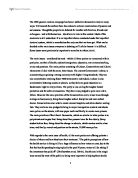How important has mass media been in deciding the outcome of recent general elections?
How important has mass media been in deciding the outcome of recent general elections?
In the digital age the media’s role in general elections is becoming more and more important. It is a way for parties to communicate their policy to the public and also enables mass media campaigns, a prime example being Blair’s in 1997. However, media can also act against parties in that they reveal scandals, such as MP’s expenses. On the other hand there is also a myriad of other factors which influence the outcome of general elections such as the economy and party leaders.
In the 1997 general election media played a fairly prominent role. Firstly, the media effectively created the ‘New Labour’ rebrand. This was as a result of Blair’s own election campaign but also his presentation by other media outlets to be a reinvigorated Labour and to be vibrant and energetic. On top of this the media portrayed the Conservatives to be corrupt and outdated, a stark contrast from the Labour rebrand. Another factor that contributed significantly to the downfall of Conservative and the rise of Labour was the revelation of sleaze allegations and sex scandals by the press which significantly damaged Conservative’s credibility and therefore lost them much of the vote and exacerbated their fall from power further and strengthened Labour’s power bid by discrediting their opposition and at general elections Conservatives are the only true opposition party to Labour and therefore if their threat is neutralised there is a clear route to power for Labour. However, a number of other factors also came into play. Firstly, the leadership of the parties played a big part. The Labour leader was a young, ‘man of the people’, Tony Blair who was perceived in the best possible light by the public. This contrasted hugely to the Conservative leadership which consisted of William Hague, a likeable man by all means but far from leadership material and far off the leadership qualities that Blair displayed; much of the British public wanted Blair, as a young and vibrant leader to represent the UK rather than Hague who represented a split and corrupt party. Moreover, the state of the parties influenced the result to a great extent. The Conservatives were split, outdated, and as previously mentioned, corrupt. The split in the party is illustrated as Michael Portillo undermined Hague by challenging for the leadership of the Conservative party. This contrasted to the emergence of ‘new Labour’, a party that people were far more willing to vote for due to its vibrant and energetic reinvigoration. Lastly, policy was also a key factor in determining the outcome of the 1997 general election. ‘New Labour’ was not only a rebranding but also a significant shift from a left-wing ideology to a far more central ideology and this change was reflected in policy as Labour attempted to become a catch-all party and therefore be applicable to as many people as possible, this shift in policy proved to be successful in Labour’s power bid and is reflected in the results as Labour achieved a giant majority of 179 seats and a 10.2% swing from Tory.








